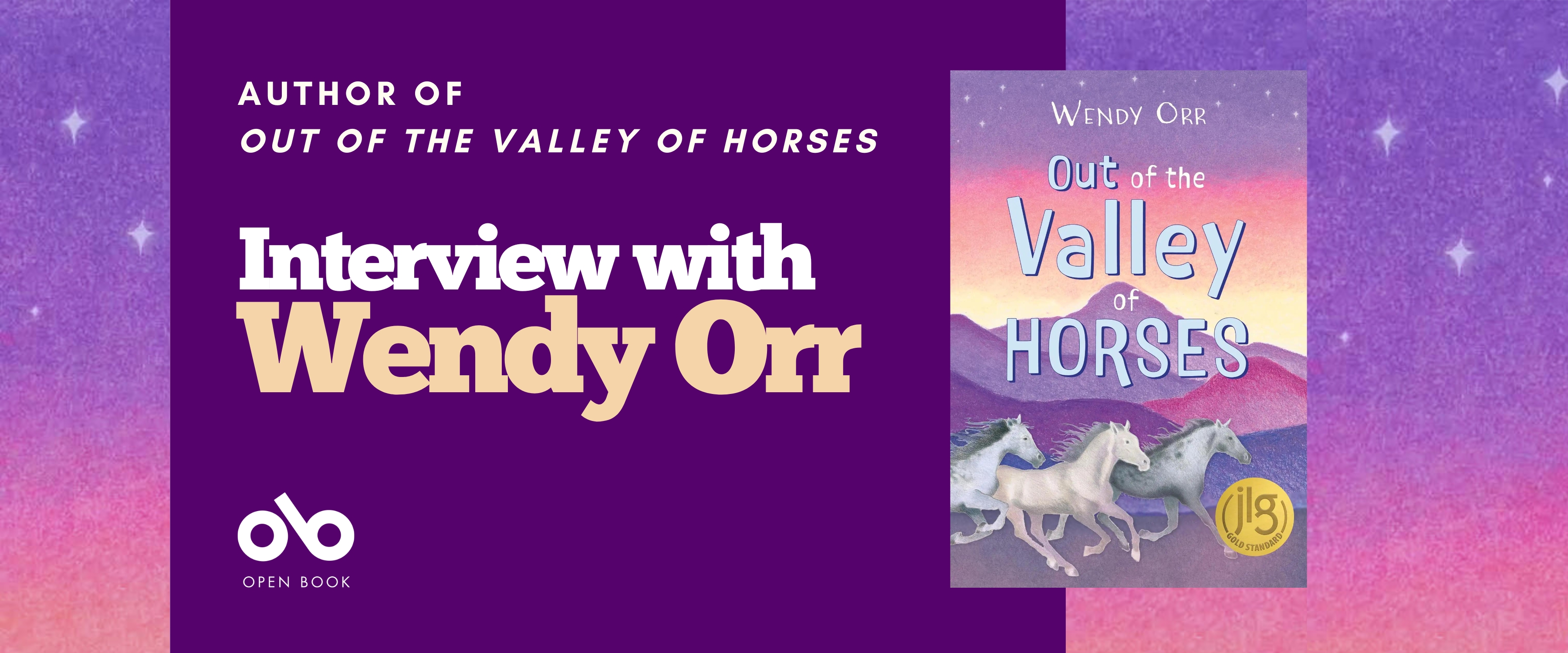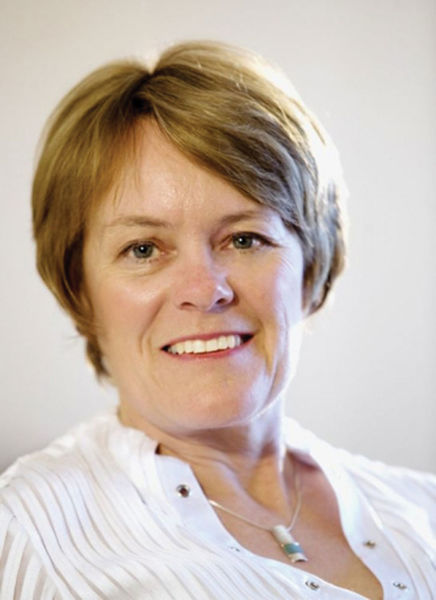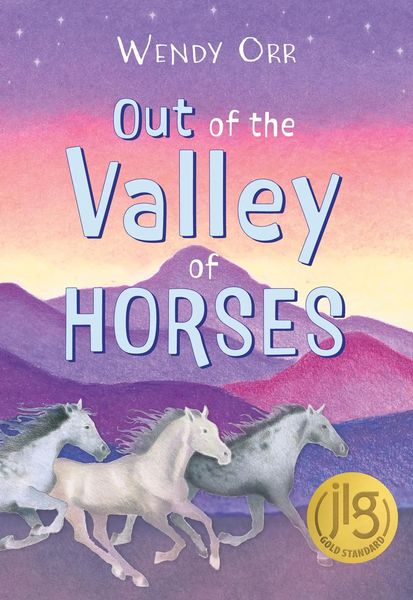Wendy Orr Takes Readers to The Valley of Horses and Beyond in Her Newest Book
During the fraught and uncertain years of the COVID-19 pandemic, author Wendy Orr and her family found themselves in Australia, locked-down and away from family back in Canada. Worried about the ways that new social norms would affect her grandchildren, and about whether she would see her parents again, she began work on a new book that would take readers on a wondrous, transformative journey.
So it was that Out of the Valley of Horses (Pajama Press) came to be. In this vibrant story, Honey and her family have been living in the titular valley for years, but have also been trapped there by a mysterious magic. With no memory of the world before, and her father set upon by illness, Honey must break the spell and escaped the valley to find help from a world that only exists in stories that she has heard.
Read more about Wendy's poignant new work in this Kids Club: Books for Young People interview with the author:
Open Book:
Tell us about your new book and how it came to be.
Wendy Orr:
The first line: "In the mountains there was a valley, and in the valley were the horses," floated into my mind several years ago, but I was still searching for its story when the pandemic happened. Suddenly, there was the conflict the story needed: lockdown, and the insidious fear that we all felt of the disease and the restrictions themselves. Living in Australia, I felt more isolated than ever before, acutely aware that I might never see my parents in BC again.
Our son, daughter-in-law and their baby and toddler, lived with us for 2019. We were all aware, not only of the children’s shyness and overwhelm around strangers, but that these uncertainties were now the norm. Friends admitted both their despair at managing homeschooling and their fear of pushing reluctant kids back to school. The more honest we were, the more we realized that we all had to face our own fears as well. The outside world had become a threat, and when it began to reopen it was difficult to convince ourselves that it was safe again.
On the other hand, there was a lot of joy in that year of togetherness. To remind ourselves of how lucky we were, we introduced a dinnertime ritual of choosing the day’s favourite things – a habit I gave to my valley family. I imagined them creating traditions to build as normal a life as possible in their extraordinary circumstances.
Life was particularly tumultuous during the writing of this book, even apart from lockdown. I formalized the synopsis the week my father died; my mother died while I was working on structural edits, though I’m grateful that she was able to read a nearly final edit, and that I was able to return by then. However, I can’t think of a better way to escape from grief than immersing myself in writing, and as we lurched from disaster to disaster (illnesses, hospitalization, a mini tornado ripping out a hundred massive trees and smashing part of the house), I kept throwing myself into the valley and its story. I like to think that the joy I found in it permeates the book, despite the grimness that initiated it.
The family - parents, recently widowed grandmother, baby Rumi and four year old Honey -wander into their beautiful valley to flee the pandemic, without any intention of staying permanently. It’s the valley itself – or perhaps the horses – that prevent them from leaving or communicating with the world outside. The question keeps looming: Is it really paradise if you can’t get out? This becomes truly crucial seven years later, when the story begins. Because, although the family have learned to thrive in this environment, the harsh reality of isolation becomes clear when Papa develops appendicitis. In the end it’s up to Honey and her horse friend Moongold to escape the valley and get medical help.
Your CanLit News
Subscribe to Open Book’s newsletter to get local book events, literary content, writing tips, and more in your inbox
OB:
Is there a message you hope kids might take away from reading your book?
WO:
I’d love kids to feel more secure about reaching out to the world and understand that we are all part of a wider community. But I also want them to feel inspired to have faith in their own courage, resilience and ingenuity, trusting that like Honey, they’ll be able to rise to a challenge when they need to. Finally, I hope they’ll come away with more respect for the natural world and a desire to live sustainably in it. That’s not too much to ask for one little book, is it?
OB:
Is there a character in your book that you relate to? If so, in what ways are you similar to your character and in what ways are you different?
WO:
The truth is that since we all have many facets to our personalities, all the characters have some of my traits, or at least an extension of different tendencies or moods. So, although I can be thrown into despair and negativity like Nana, I’ve also got Papa’s denial of reality and insistence that everything will turn out fine. However, I am most like the protagonist Honey; as I wrote I put my 11-year-old self into her world and imagined what I would have done or what I’d have wished I’d be brave enough to do. When I was 12 and we were about to move from Colorado to Toronto, our horse started refusing to get into the horse trailer, which was obviously going to make it very difficult to take her. Rather than risk her being sold, I decided I would run away and ride her there. I’d started storing supplies and trying to find a map for this foolproof plan, when luckily the horse started responding to the encouragement of being fed in the trailer.
The main difference in our personalities is that Honey, having lived in isolation for all her remembered life, doesn’t know how to form friendships or relate to people outside the family. I like to think that although she may retain some hesitancy, she will quickly learn the joys of friendship, which is a hugely important part of my own life.
OB:
How do you cope with setbacks or tough points during the writing process? Do you have any strategies that are your go-to responses to difficult points in the process?
WO:
The difficult points are usually during the structural edit meeting with my publisher and editor. After saying lots of nice things, they gently bring up the story’s problems. Sometimes the issues appear insurmountable but I’ve now realized that dealing with them follows a similar pattern to the classic stages of grief.
Denial: They’re crazy! My solution is perfect.
Despair: They’re absolutely right. The book doesn’t work; there’s no possible solution. I’ll have to scrap the whole thing.
Begrudging acceptance: I could just try their suggestion.
Excitement: Their suggestion has led me to something even better! I can’t wait to rewrite.
Moving between these stages usually involves EFT tapping (tapping on acupressure points while talking about a problem), lots of long walks, and sometimes remembering to meditate. However I think the two most important things are simply to acknowledge that there is grief around finding a major flaw in your work, and to remember that your editors want the same thing you do – the best possible story. Even if their suggestion for a particular issue is not perfect, you can guarantee that if they’re seeing a problem, a reader will too - you definitely need to work it out.
OB:
What's your favourite part of the life cycle of a book? The inspiration, writing the first draft, revision, the editorial relationship, promotion and discussing the book, or something else altogether? What's the toughest part?
WO:
Promotion is definitely the worst. A new book is so much a child of my heart that I have a deep-rooted fear of jinxing its life by telling the world how wonderful it is. Out of the Valley of Horses is about my fiftieth book, but I wept with mingled joy and relief at its first beautiful reviews. And though I’m very happy speaking about my work in public, organizing an in-person launch fills me with dread – what if no one turns up, or the people who turn up don’t like the book? Also – how can I make a book-themed social media post as appealing to my followers as photos of puppies?
The actual writing, however, is a joy. I love all its parts, and depending on which stage I’m up to and how things are flowing, would choose each of them as my favourite, and occasionally my most dreaded. I love the freedom and exploration of growing a seed from inspiration to story – but the first draft is filled with even more excitement and ‘Aha!’ moments as it begins to come together. Working with editors is another type of joy: that of hearing my thoughts from another perspective, and knowing that someone else understands my story and its characters and can help me add to their growth. Later drafts have more of a problem-solving enjoyment, with the satisfaction of finally seeing things fall into place.
OB:
What are you working on now?
WO:
It’s still a bit cloudy, mostly in stacks of assorted notebooks, but there are kids and trees, ancient forests and an amulet waiting for the owner who’ll discover its magic…
______________________________________________
Award-winning author Wendy Orr was born in Edmonton, Alberta. The daughter of an Air Force pilot, she has since lived around the world, including several years in Colorado, in France, and England where she studied Occupational Therapy. After graduation, Wendy settled in Australia, but returns home yearly to visit her family. Wendy’s many books for children have been published in 27 countries and won awards around the world. Prominent among them is Nim’s Island, which was made into the 2008 film of the same name; a 2013 sequel, Return to Nim’s Island, was loosely based on Orr’s book Nim at Sea.







